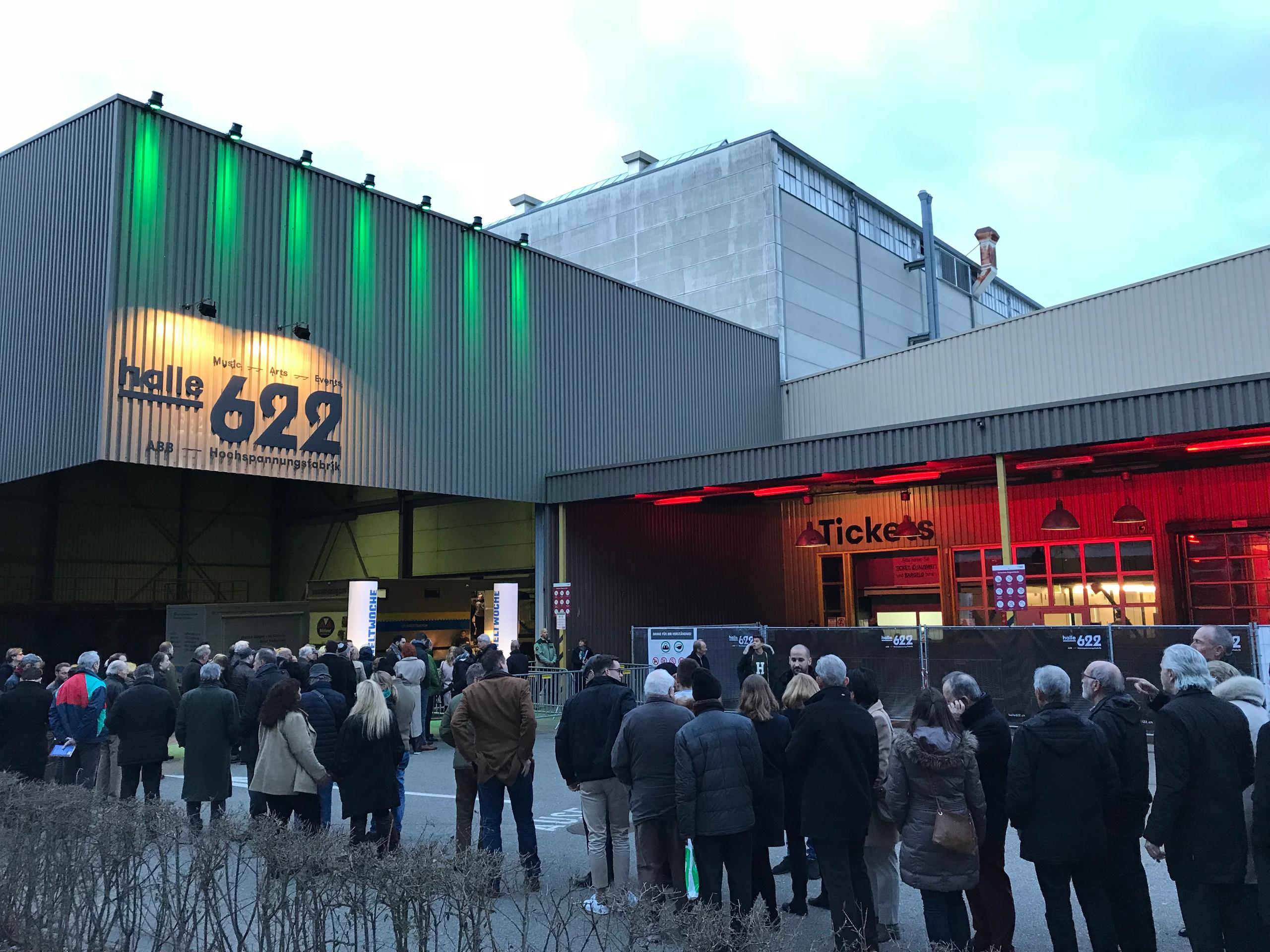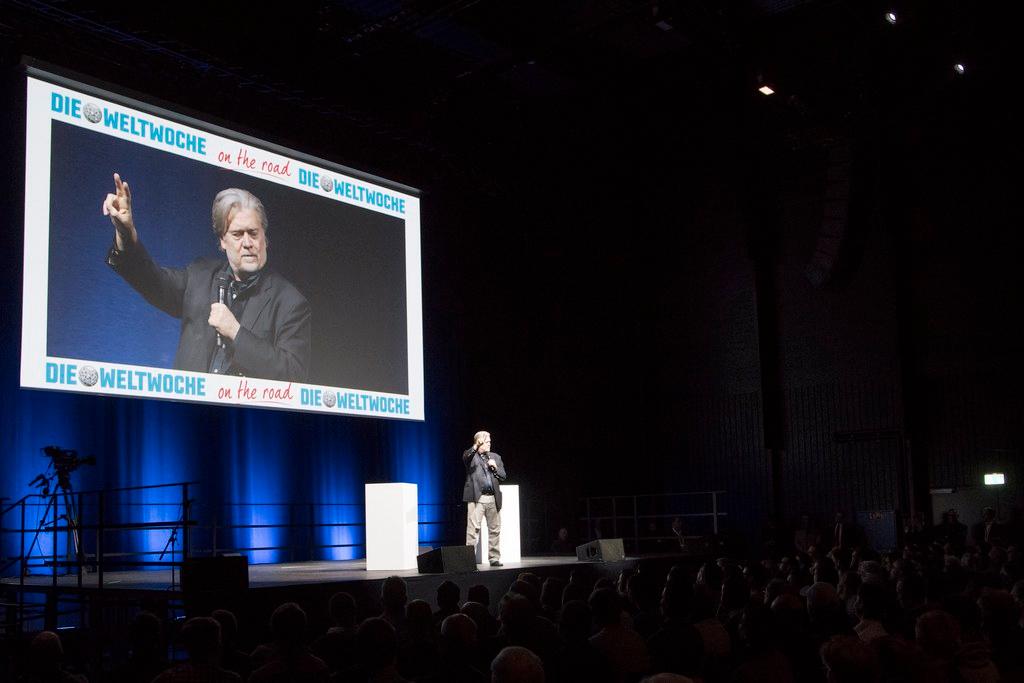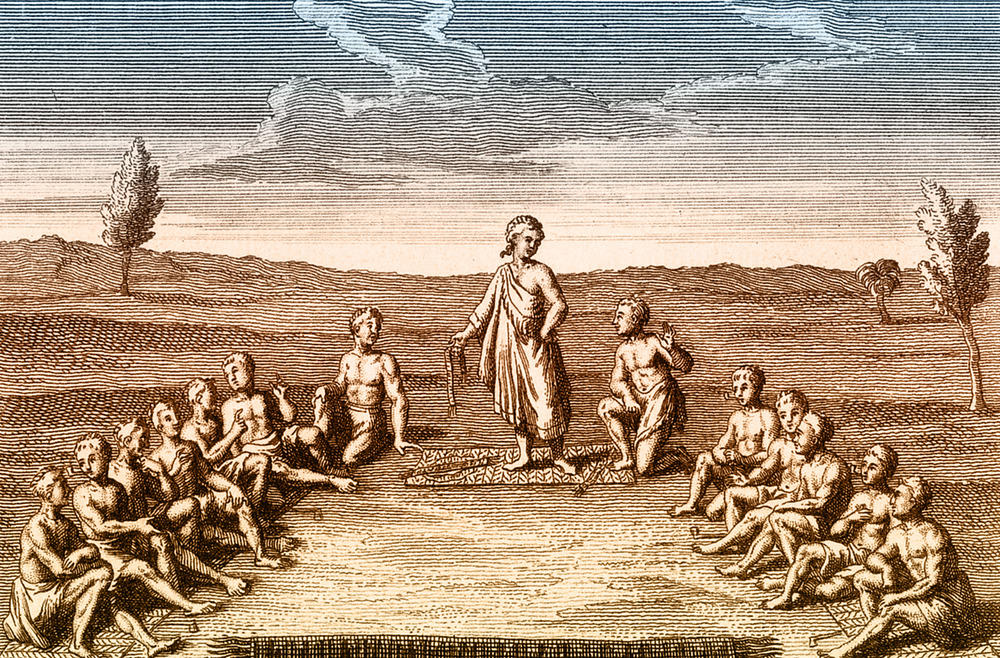Bannon brings his ‘populist revolt’ to Zurich

In front of a sold-out crowd of over 1,500 in the Swiss city, former Trump chief strategist Steve Bannon spoke about the reasons for right-wing resurgence in Europe, and why the coming years will be far from stable.
The list of items banned from the Zurich venue is long: guns, knives, axes, handsaws; fireworks, megaphones, hi-fi systems; photography equipment and laptops; umbrellas, selfie-sticks, pets; even, oddly enough, roller shoes.
But neither the airtight security nor the dreary March evening has stopped a huge crowd turning out to see the European début of Steve Bannon – former chief strategist of Donald Trump and editor of alt-right Breitbart News – on Tuesday night, where he was invited to speak on the future of global populism by Swiss magazine Weltwoche.
At 6:30 pm the queue to enter the Halle622 venue in the Oerlikon district stretches 20 metres down the street; by 7, half an hour before the event is due to start, it’s ballooned almost as far as the local train station. “Ausverkauft!” Weltwoche’s website has proclaimed for the past week – sold out… Those present are the ones lucky enough to have signed up on time.
What’s the attraction?
Bannon is no longer the Svengali of the upper echelons that he was this time last year – when Time magazine called him the “second most powerful man in the world”. But Swiss media and public have been breathlessly anticipating (both positively and negatively) the visit for days.
“I bought a ticket as a birthday present for my father, who is a bit more conservative than me,” says Christoph, a young man from Bern. Bannon is too extreme for him personally (“I think he’s a bit crazy”), but he’s looking forward to hearing something interesting, he says by the venue bar.
This is echoed by others. One blogger tells me he wants to see Bannon’s “charisma” in the flesh; my audience neighbour, scientist Oliver from Luxembourg, reckons it’s important to witness such figures for yourself. “It’s not dangerous to listen to people,” he says, “it’s only dangerous to vote for certain people.”

Perhaps moderator Roger Köppel, Weltwoche editor-in-chief and Swiss conservative right parliamentarian, sums up the interest best when he introduces him, rather lengthily, as the “architect of the surprising electoral victory of Donald Trump.” Bannon’s current status may be mitigated, but his legacy and reputation were cemented by the 2016 coup.
The anticipation in the hall, usually used as a music venue, builds under a backdrop of warm-up songs ranging from “Eye of the Tiger” to “Tonight’s Going to be a Good Night”. After the rock concert-style queuing, the waiting audience is calm. Will he live up to the hype?
The applause when he finally climbs on stage reflects the caution: not the “thunderous” reception demanded by Köppel, nor a “barn rally in Alabama”, as Bannon put it, but hearty. A few approving whistles ring out. There are no (vocal) protestors in attendance, though reports later said a left-wing demonstration had passed off peacefully outside.
Anti-establishment tide
Bannon quickly finds his stride. Speaking without notes for the next half hour, he begins with the Brexit vote (for which Breitbart London must take large credit, he says) before running through a global host of current preoccupations, all revolving around what he calls the worldwide “populist revolt”: the bottom-up anti-establishment tide that took Donald Trump to power and is now sweeping across Europe.
The revolt in fact began right here, he said. In 1992, when Christoph Blocher (“Trump before Trump”) stood alone against the elites to save Switzerland from entry into the EU. He says this is one of the reasons he chose Switzerland as venue for such a speech; the others being the “extraordinary” direct democracy system and the country’s innovation on cryptocurrencies, which he sees as the decentralised future of people-led financing.

More
Bannon: ‘Blocher is Trump before Trump’
He swiftly runs through the reasons for this populist surge (central banks and central governments are “debasing” currencies and citizenship); the fact that the movements are different in each country yet linked by a certain “symbiosis”; the threat to the West of the rise of China (it must be combated by import tariffs); the threat of financial crisis, of instability, of the “turmoil” which is coming down the road once established structures are overthrown.
Most of the audience seems convinced, or at least entertained. Spontaneous applause, hardly a Swiss speciality, breaks out frequently. None more frequently that when he makes several digs at the “corrupt” Clintons and the “opposition mainstream media” (“I know you’re out there”); and when he bigs up his host’s country (“Switzerland is a financial superpower!”).
Overall, the presentation is smooth and polished, if confrontational. As for his previous boss, President Trump, who said that Bannon had “lost his mind” after several comments by the latter were published in Michael Wolff’s bestselling ‘Fire and Fury’, Bannon retains a respect bordering on reverence: “I love the guy, I think he’s done a great job”, he says. Even if they don’t talk so much anymore…
Prophet of future upheaval?
Beyond the talk, the reasons for Bannon’s foray into European politics are not fully clear. Is he looking to reinvent himself after his fall from political grace in the US over the past year? Is it simply a money-maker with media exposure? Köppel has not said how much Bannon was paid to attend; but at CHF40 a head, and with a 1,600-strong crowd, somebody has made a tidy profit.
Yet, as political scientist Daniel Warner wrote on Monday, there is something deeper that attracts so many to Bannon: that ideology, that he touches on tonight, the particular brand of barn-burning “nationalist populism” (as he phrases it himself) that is so crude but so clear – and highly persuasive in turbulent times.
“People, deep down, are determined to chase out the political class,” he said in a Weltwoche interview published in the lead-up to the talk. We might not read about it every day in the media, but the groundswells of discontent are simmering, he maintains.
Just before his Zurich appearance, Bannon was in Italy, to advise and witness the victory of anti-establishment parties in national elections on Sunday. Another to add to the list spreading across the continent. Does he see himself as the revolutionary leader to foment such sentiments through Europe?
He doesn’t go so far. But his confidence is palpable. “The populist surge is not over,” he says. “It’s just beginning. The tide of history is on our side.”

In compliance with the JTI standards
More: SWI swissinfo.ch certified by the Journalism Trust Initiative













You can find an overview of ongoing debates with our journalists here . Please join us!
If you want to start a conversation about a topic raised in this article or want to report factual errors, email us at english@swissinfo.ch.